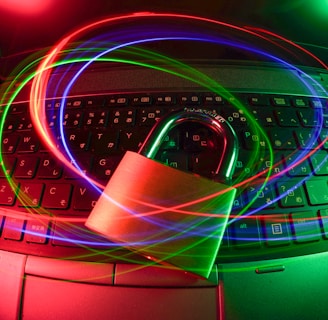How to Protect Against Online Hacking: 10 Essential Cybersecurity Tips
Update
1/3/2025


How Can We Keep Our Data Safe From Hackers?
As technology increases connectivity and accessibility, so do hackers and their ability to steal information. With almost everything being interconnected, even up to refrigerators at home, our data privacy is really more prone to hacking. To better protect yourself, read up on the following tips and apply these to keep your data and connection secure.
Use Strong, Unique Passwords
One of the simplest yet most effective ways to protect yourself from online hacking is by using strong, unique passwords for each of your accounts. A strong password typically includes a mix of upper and lower case letters, numbers, and special characters. Avoid using easily guessable passwords like "123456" or "password." Consider using a password manager to generate and store your passwords securely.
Enable Two-Factor Authentication (2FA)
Two-factor authentication (2FA) adds an extra layer of security to your accounts by requiring a second form of verification, such as a code sent to your phone, in addition to your password. This ensures that even if a hacker obtains your password, they won’t be able to access your account without the second factor. Enable 2FA on all your critical accounts, including email, banking, and social media.
Keep Your Software Updated
Cybercriminals often exploit vulnerabilities in outdated software to gain access to your system. To protect against online hacking, always keep your operating system, browsers, and other software up to date with the latest security patches. Enable automatic updates whenever possible to ensure you're protected against the latest threats.
Be Wary of Phishing Scams
Phishing is a common tactic used by hackers to trick you into revealing personal information, such as passwords or credit card numbers. These scams often come in the form of emails or messages that appear to be from legitimate sources, such as your bank or a popular website. Always double-check the sender's email address and be cautious of any unsolicited requests for personal information. If in doubt, contact the company directly using official contact details.
Secure Your Wi-Fi Network
Your home Wi-Fi network is a potential entry point for hackers. Ensure your network is secure by changing the default router password, using WPA3 encryption, and hiding your network's SSID (the network name). Additionally, consider using a strong, unique password for your Wi-Fi network and regularly update your router's firmware.
Install and Use Antivirus Software
Antivirus software is essential for protecting your devices against malware, viruses, and other online threats. Ensure you have reliable antivirus software installed on all your devices, and keep it up to date. Regularly scan your system for any potential threats and follow the software’s recommendations to remove any malicious files.
Avoid Public Wi-Fi for Sensitive Transactions
Public Wi-Fi networks are often less secure and can be a hotspot for hackers. Avoid accessing sensitive accounts, such as online banking or email, when connected to public Wi-Fi. If you must use public Wi-Fi, consider using a Virtual Private Network (VPN) to encrypt your data and protect your online activities from prying eyes.
Be Careful with Social Media
Hackers can use information you share on social media to launch targeted attacks. Be mindful of the personal details you share publicly, such as your location, date of birth, or family members' names. Adjust your privacy settings to limit who can see your posts and personal information, and avoid sharing sensitive information on social media platforms.
Regularly Back Up Your Data
Regularly backing up your data is a critical step in protecting yourself against online hacking. In the event that your system is compromised, having a backup allows you to restore your files without paying a ransom or losing valuable information. Use a combination of cloud storage and external hard drives to ensure your backups are secure and accessible.
Educate Yourself and Stay Informed
Staying informed about the latest online threats and cybersecurity best practices is one of the best defenses against hacking. Follow reputable cybersecurity blogs, attend webinars, and keep up with the news to stay ahead of potential threats. The more you know about the risks and how to mitigate them, the better protected you’ll be.
We might be so used to accessing our bank accounts or email on the daily that we forget that we have to keep an eye on the where's and when's of accessing them and we may become lenient or complacent when it comes to cybersecurity. While systems are in place, let us remember that the first level of protection comes when we do guard our own data ourselves.

Read More
FAQs

Guest Creative Team: Certified Health and Wellness Guide
Top 15 Foods For Clear and Smooth Skin
Best Lighting Options For Your Aquarium
When done well, the right lighting will not just benefit your enjoyment, but the overall health and longevity of your fish. [Read more]
Home Organization: Decluttering and Storage
Sometimes it's not about the mess, it's about organization. Items not stored properly will start to look like a mess, and with time, it just won't look good. [Read more]
Get Featured
Be our online feature of the month, a guest contributor, or promote your business
Some links on our website are affiliate links. This means we may receive a commission to support our production if you click through and make a purchase from one of our partners. This comes at no additional cost to you.
FREE SUBSCRIPTION!
Get FREE monthly newsletter, discounts, and freebies!
Montecilla MMR / 21ebizmedia@gmail.com
Montecilla MMR / 21ebizmedia@gmail.com


Vibrant Living
WEEKLY
Vol 01 Issue 05
Editor's Pick Special Issue
The Best Beach Destinations for 2024
TOP TEN SMART Kitchen Gadgets
Top Ten Beauty Hacks
TOP GARDEN MAKEOVER FAVORITES
MORE INSIDE!
Copyright 2024. Vibrant Living Weekly Magazine. Privacy Policy. Terms and Condition.
